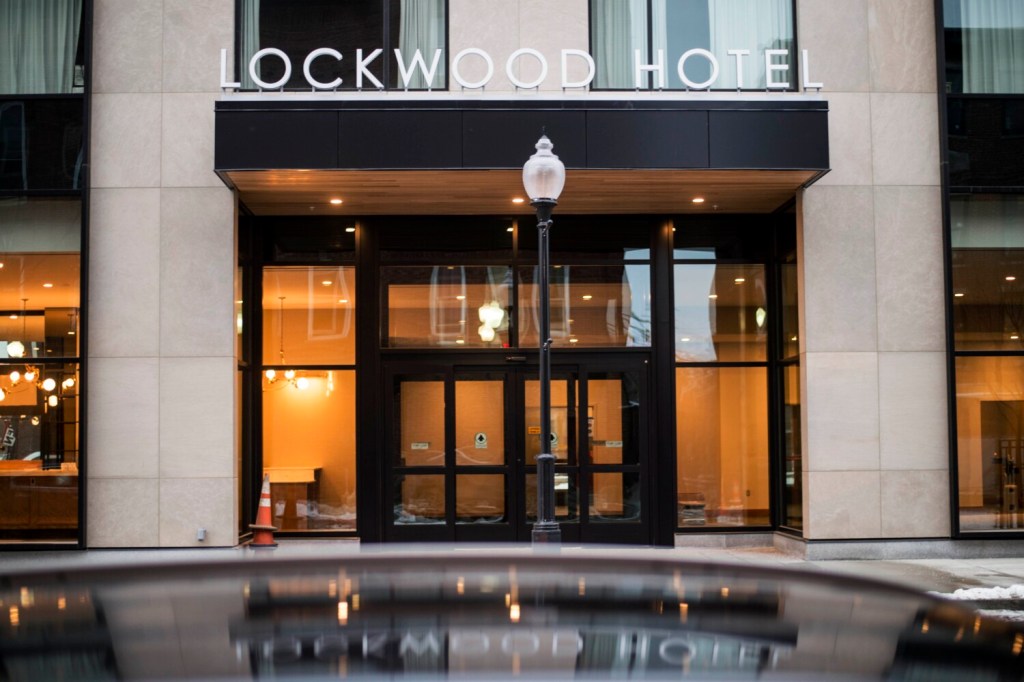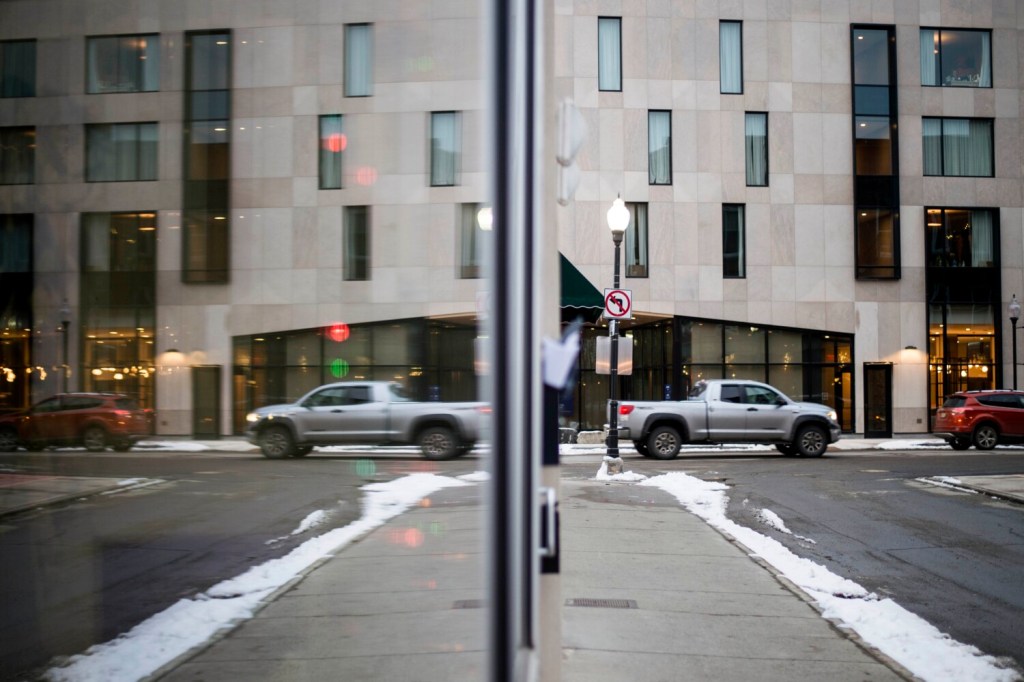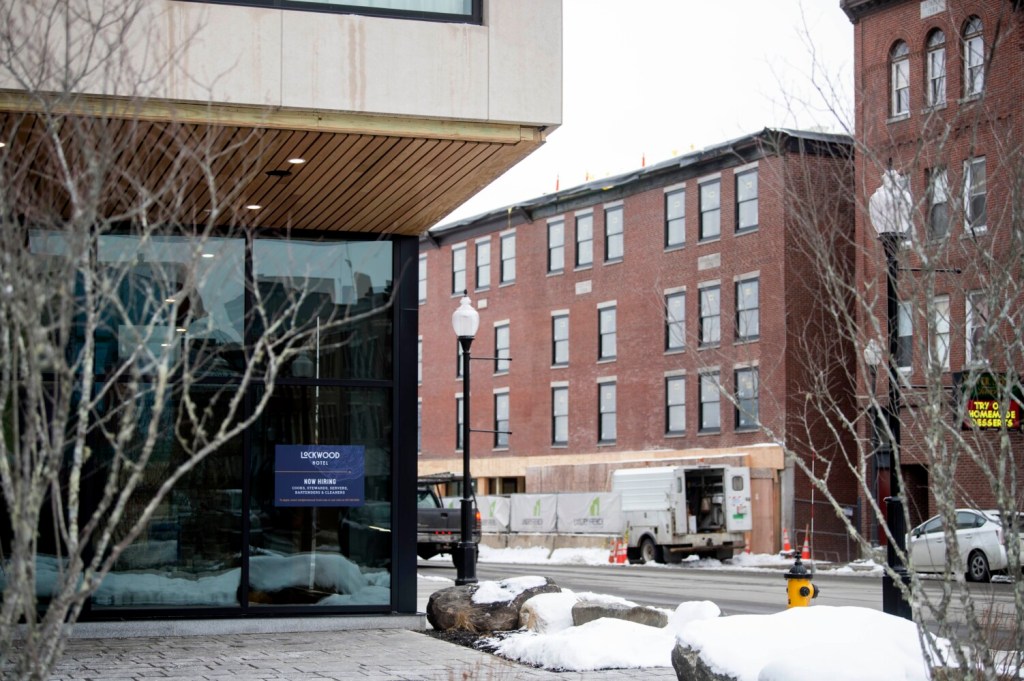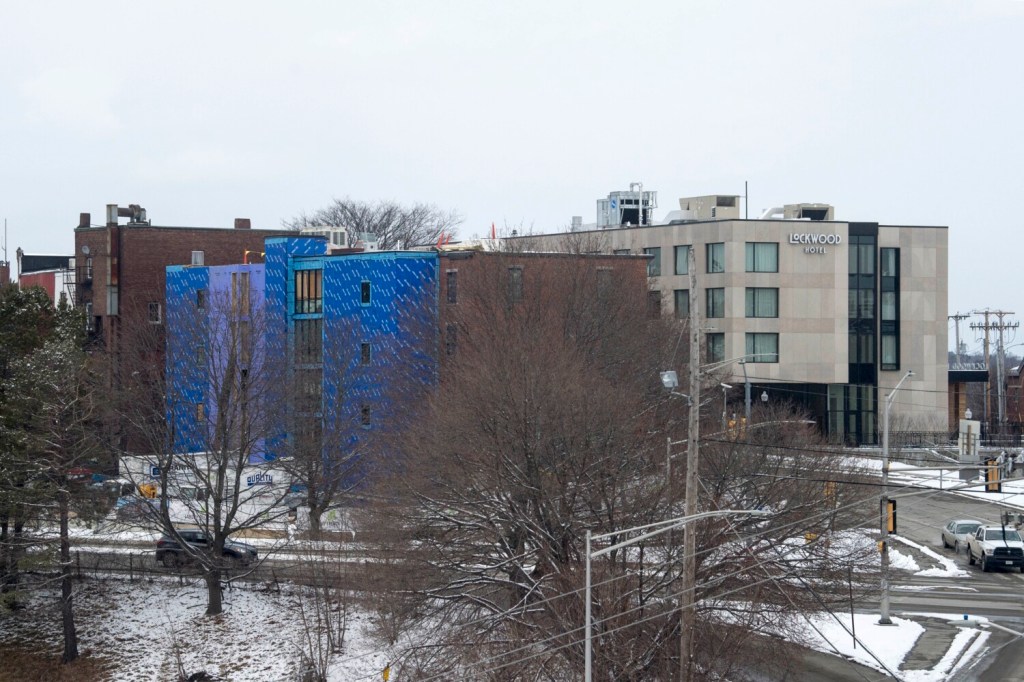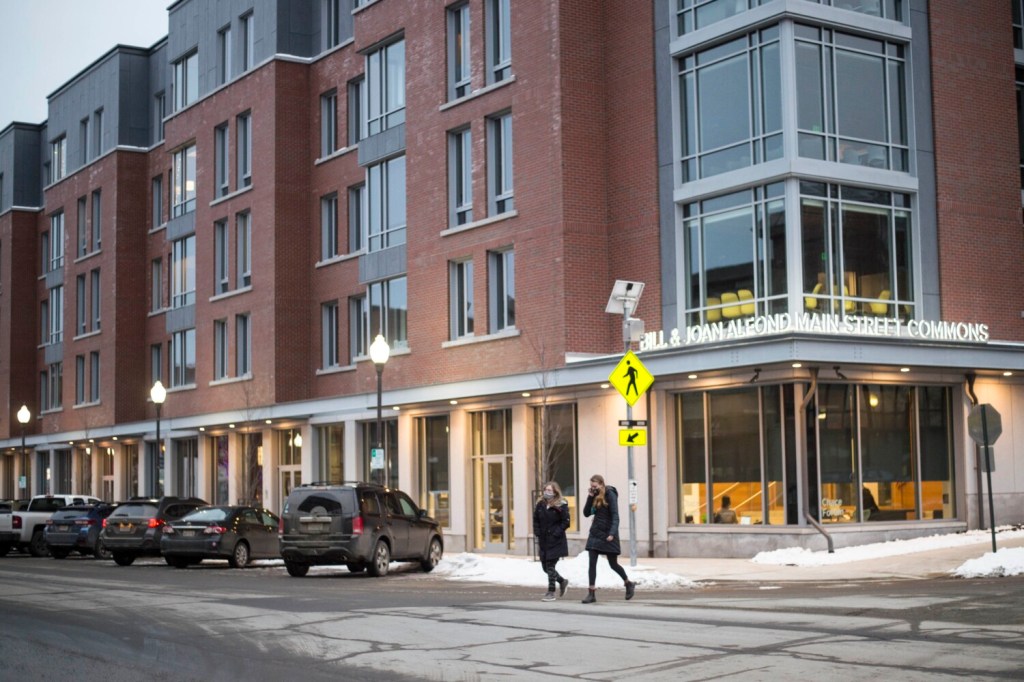WATERVILLE — Colby College officials hope to open the Front & Main restaurant inside the Lockwood Hotel on Main Street downtown in late spring and the hotel itself, in late summer, if all goes according to plan and it is safe to do so.
The $26 million hotel is just one of a bevy of projects on tap for this year downtown, including the start of work on the city’s $11.2 million revitalization project to include changing the traffic pattern on Front and Main streets, and improving intersections and sidewalks. That project will begin this spring and is expected to be completed in the second half of 2022.
Brian Clark, Colby’s vice president of planning, said Wednesday that hiring will take place for hotel jobs over the summer, and it is anticipated that when the hotel is up and running, 55 to 60 people will be working there.
“We’re looking for great people,” he said.
The hotel will be managed by Charlestowne Hotels. The general manager for the property is Jordan Rowan, who already is working on site and has been in the area since fall; Maine native Jesse Souza, who attended school in the Bangor area and recently returned to Maine from Seattle, was hired as executive chef for the hotel and restaurant; and Waterville native John Phillips-Sandy is director of food and beverage for the hotel, according to Clark.
The hotel guest rooms were retrofitted in response to the coronavirus pandemic for 100 Colby students whose semester will end in May. After that, for the next three months, the student furniture and temporary carpets will be removed from the building and the rooms transformed into hotel guest rooms, according to Clark. Most of the construction on the building itself is expected to be completed in the next couple of weeks, he said.

The Lockwood Hotel, left, and the Colby Arts Collaborative, center back, and Silver Street Tavern, right, on Main Street in Waterville. Michael G. Seamans/Morning Sentinel
Plans to develop the Verna’s All Day restaurant on the ground floor of the Bill & Joan Alfond Main Street Commons at 150 Main St. were placed on pause because of the pandemic, but Clark said the owners, Andrew and Briana Volk, are back discussing design plans and it is anticipated the eatery will open when the weather gets warmer.
He said the Volks have been focusing on their Portland Hunt & Alpine Club restaurant in that city and making sure their staff is taken care of during the pandemic.
About 200 Colby students and staff live on the upper floors of the Alfond Main Street Commons building, which also houses Camden National Bank on the ground floor.
At 173 Main St. across from the Commons, Bixby & Co. is scheduled to move into a space just north of Portland Pie Co. in early to mid-summer, according to Clark. A Rockland-based chocolatier, Bixby will feature an artisan chocolate café and store. The business’ founder and chief executive officer is Kate McAleer.
Meanwhile, across Main Street from the hotel, work on Colby’s Arts Collaborative continues.
Located at 14 and 20 Main St., the buildings are being transformed into a hub of creativity that will offer studio space and programming for artists, students and educators from around the world.
The $6.5 million project was announced in February after Peter and Paula Lunder, formerly of Waterville, provided the project with a $3 million donation through the Lunder Foundation.
“That is progressing on schedule,” Clark said. “Construction is moving along really well. We are on schedule to be completed in April.”
The building has a new roof, the floors have been redone, and new windows installed. A small addition to the back of the building houses an elevator, stairwell and work rooms.
Plans for the $18-$20 million Paul J. Schupf Art Center next to Castonguay Square will go before the city’s Planning Board this spring with construction to start in late spring-early summer, according to Clark. The building, to include a glass wall facing Castonguay Square, will include a cinema, art gallery and cafe, among other features.
Meanwhile, the $11.2 million downtown revitalization project, the funding for which includes a $7.37 million federal BUILD grant and funding from the city, Colby and the state Department of Transportation, will be launched as other initiatives progress. With all the activity, Waterville is poised for exciting developments downtown, according to Clark.
“Waterville’s moving while a lot of other places are holding steady,” he said.
WATERVILLE A LEADER
Garvan Donegan, director of planning, innovation and economic development for the Central Maine Growth Council, agrees with Clark that the city is poised for great things.
Donegan goes so far as to say the economic development initiatives, including the focus on the arts, go beyond that of what many other communities of Waterville’s size are doing across the country. The efforts likely represent the largest number of economic development initiatives the city, and probably the region, has ever seen, according to Donegan.

The Bill and Joan Alfond Commons, right, and The Hains Building on Main Street in Waterville. Michael G. Seamans/Morning Sentinel
He noted that, even through the pandemic, those efforts continued.
“Basically all our projects of medium or large size are all still moving forward and limited to no strategic pauses like what we’re seeing around the country,” Donegan said.
What has enabled that progress is a good diversity of stakeholders and investors, including Colby and the Harold Alfond Foundation, which reduces the risk profile, according to Donegan. Colby and Thomas colleges, as well as Kennebec Valley Community College in Fairfield, contribute to the expanding innovative economy and entrepreneurial vibrancy of the area.
“I think we’re kind of punching way above our weight class,” Donegan said.
The Growth Council is directly involved in attracting federal research and development dollars and supporting entrepreneurs. Donegan, for instance, helped the city and Waterville Community Land Trust apply for a planning grant that could lead to receiving a total of $400,000 to help improve the lives of low-income people in the South End and North End of the city, as well as downtown.
The Working Communities Challenge Grant initiative is sponsored by the Federal Reserve Bank of Boston. In December, Donegan sent a letter of interest on behalf of the city saying it wanted to be included in the process. The city was notified it had been invited to be included and now is applying for a design grant.
Donegan said Thursday that businesses have been incredibly resilient during the pandemic. The city is selling commercial properties near the city-owned airport that had been sitting vacant for a while and there have been a lot of requests for purchase and sale agreements along Kennedy Memorial Drive and Main Street, he said.
“I think Waterville has been known for its leadership in the arts and downtown community, but also emerging as a leader working on innovation and really working to be very welcoming to rural remote workers,” he said.
Other recent developments downtown include the sale of the building at the corner of Main and Silver streets from the Rancourt Family Trust to Don Plourde. Donegan said the Paragon Shop on the ground floor of the building has been sold and the new owner plans to continue the legacy of the former owners and bring new life to the store as well.
Donegan noted that work is expected to start sometime this year on plans to develop the former Lockwood Mill buildings north of the Hathaway Creative Center on Water Street into commercial, retail, and market rate and workforce rate housing. The buildings’ owner, North River Company also owns Hathaway, as well as the Fort Andross mill in Brunswick, and significant holdings in Portland including the Pierce Atwood building on the waterfront, according to Donegan.
“We are excited that the trend line on that redevelopment project is still progressing,” Donegan said. “It’s still trending well and still consistent with the developer’s game plan.”
The construction work is scheduled to happen in two phases, according to Donegan.
“That’s a real big deal for the downtown and the region — and for the housing stock,” he said.
Send questions/comments to the editors.


